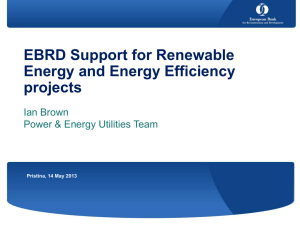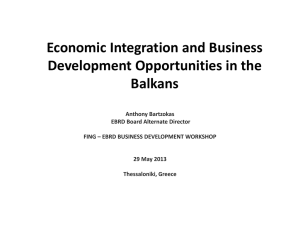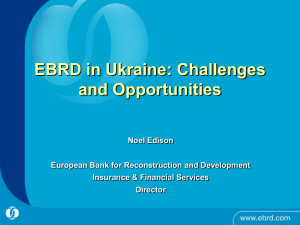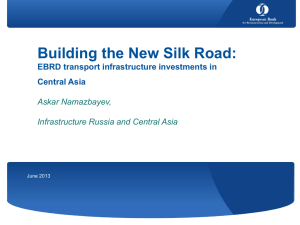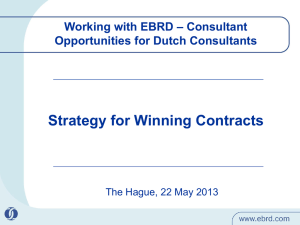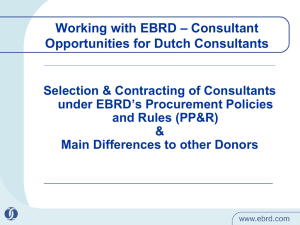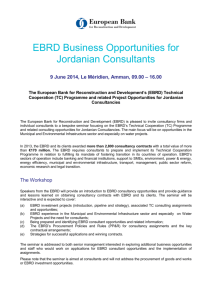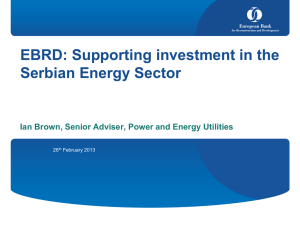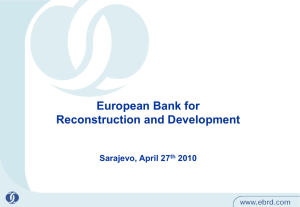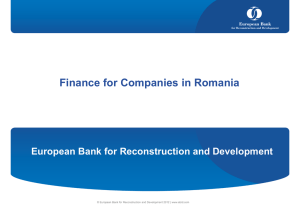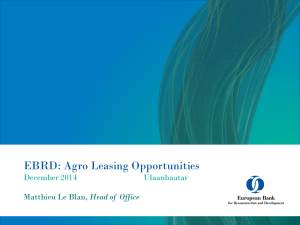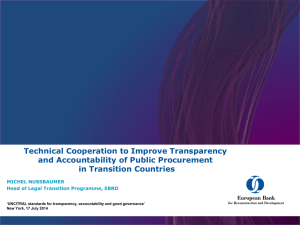EBRD
advertisement
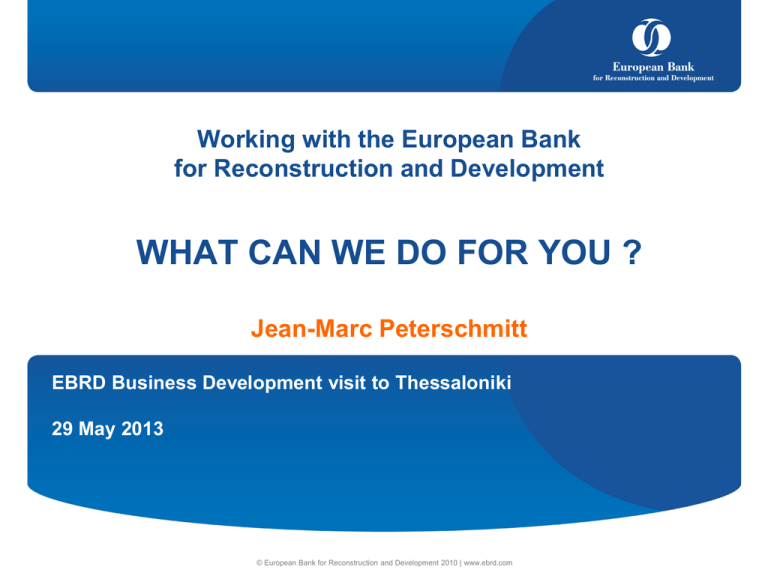
Working with the European Bank for Reconstruction and Development WHAT CAN WE DO FOR YOU ? Jean-Marc Peterschmitt EBRD Business Development visit to Thessaloniki 29 May 2013 © European Bank for Reconstruction and Development 2010 | www.ebrd.com EBRD: an institution to promote market economies An international financial institution established in 1991, owned by the governments of 64 countries and 2 inter-governmental institutions (EU, EIB) Crisis: + 50% Headquartered in London, the EBRD invests in all countries from Central and Eastern Europe to Central Asia In 2011, the Bank expanded its operations to include Egypt, Morocco, Tunisia, and Jordan (Southern and Eastern Mediterranean – SEMED region) A capital base of €30 billion and ~ €81 billion cumulative commitments. Portfolio: ~ €37 billion Annual new commitments of ~ €9 billion/year 2 Shareholding Structure and Rating EBRD has a AAA rating from all three main rating agencies As at 13th July 2012 Footnotes (1) Includes European Community and European Investment Bank (EIB) each at 3%. Among other EU countries: France, Germany, Italy, and the UK each holds 8.6% (2) Russia at 4% 3 Where We Operate 34 Countries All of Greece’s neighbours Most of Greece’s FDI destinations 4 EBRD: Investment Portfolio Unaudited as at 30 Apr 2013 5 Tailoring Financing for Project Needs EBRD operates commercially / higher risk appetite than the private sector EBRD takes political and commercial risk Large or small (€2 to €250 million) Broad range of instruments Debt - Long term (up to 10 years or more) and short term loans: capex and WC - Senior, subordinated or convertible loans - Project risk or parent guaranteed - Floating or fixed rate; EUR, USD or local currency (in selected countries) Equity - Minority positions (usually up to 25%) - Common or preferred stock - Mezzanine finance Other instruments - Guarantees - Currency swaps *Note: Subject to market conditions and availability 6 EBRD: Key Success Factors Institutional strength Internationally recognised financial partner with a longterm perspective Close relationships with governments and shareholders Political leverage due to mandate Preferred Creditor Status, AAA credit rating Working closely with market sources of capital to fill “market gaps” Operational focus Knowledge of local market, business environment and practices; local presence Engaged minority partner for businesses Risk sharing, including political Catalyst in mobilising commercial co-financing Expansion, privatisation, M&A, restructuring Promoting high standards: Corp. governance and compliance Environment Improve people’s lives: jobs, quality of services 7 Focus on South Eastern Europe 08/04/2015 8 Portfolio geographic distribution Unaudited as at 30 Apr 2013 9 EBRD in SEE: Annual Business Volume 2008-2012 10 EBRD in SEE: Sectors 2008-2012 11 Joint IFIs Recovery Plan for Central and South Eastern Europe Region challenged and vulnerable. Low growth, lack of investment. Bank deleveraging. Need to mobilise finance and have IFIs to work together to support investment aimed at growth €30 billion pledged by the European Investment Bank (20bn), the World Bank (6bn) and the EBRD over 2013-2014 for the countries of Central and South Eastern Europe Create a fresh momentum Greece has a role to play in this as a major trade and investment partner for SEE, as well as logistical position More trade, more investment, more physical integration (infra) 12 2013 operational priorities in SEE: Corporate sector Promote and support FDI – almost disappeared Support MSMEs Any type of capital expenditure but also assist in financial restructuring and provision of liquidity Promoting energy efficiency improvements Supporting local agribusiness sector in raising quality standards and expanding in the region Investing in “knowledge” economy, either directly or via private equity funds Selective projects in property and tourism sector, stressing business integrity 13 2013 operational priorities in SEE: Financial Sector Stabilisation of financial institutions. Strengthening of capital base, providing LT funding and helping address non-performing loans problems Supporting systemic restructuring/consolidation efforts in the banking sector Help mitigate the effects of deleveraging, including through re-financing of existing loan portfolios and diversification from parent funding Continuing to develop on-lending programmes with local banks focusing on SME funding and energy efficiency, including with the support of EU grant funds Supporting development of local capital markets and related instruments 14 2013 operational priorities in SEE: Energy & Infrastructure Sectors Energy Sector – EBRD will focus on Regional integration and energy security: transmission interconnections and rehabilitation of power generation Energy efficiency for corporate, residential and municipal clients Financing regional oil and gas pipelines Selective projects in mining Infrastructure sector – EBRD will focus on • Regional integration through financing rail and road links, with a focus on trans-European corridors, incl. cross border projects with Greece • Rehabilitation of national roads and development of airports and ports • Develop bankable and transparent PPPs • Water, wastewater, solid waste (meet EU environmental standards) and urban transport modernisation sectors • Facilitating the absorption of EU cohesion and structural funds to provide sub-sovereign co-financing to small and medium-sized municipalities 15 EBRD and Greece 16 Greek Clients: Role in EBRD Investments €2 billion of EBRD investments along Greek clients and cofinanciers Greek-EBRD investment have been especially strong in Romania (23%), Bulgaria (15%), Russia (13%) but also Serbia and others Dominant investment sectors include: Industry and Agribusiness (46%), Energy (23%), Financial Institutions (22%), Infrastructure (9%) Current or past clients include: all major Greek banks, Titan Cement, OTE, Hellenic Petroleum, Germanos, Copelouzos, Mornos, Yioula Glass, Elbisco, Loulis, Global Finance, Viohalco (SofiaMed) and some more in current pipeline 17 Issues during crisis time Opportunities domestically are limited, cash under pressure, business and financing models need to be reviewed Bank financing (domestically or outside) from existing banks limited and inadequate in terms of tenor or size. Refinancing difficulties. Over-leverage. Need to diversify ownership and financing sources of foreign subsidiaries. Stabilise and make sustainable Get fresh capital and long-term debt for operations outside Greece, to support operational and financial restructuring. 18 EBRD : Initiative aimed at Greece Greece is not an EBRD Country of Operation - investments in Greece are not possible on the EBRD balance sheet However: EBRD can invest alongside Greek sponsors in SEE, Turkey, SEMED Areas for cooperation: 1. Support Greek corporates outside Greece: existing, new, JV, greenfield 2. Greek bank subsidiaries (outside Greece) – incl. co-financing corporate clients 3.Trade Facilitation (working with local banks) 4.Cross-border infrastructure and energy sectors (linking Greece and other countries) 19 EBRD – Greece Case Study Examples 20 Sofia Med Bulgaria Signed in 2013 • Client: Sofia Med, is the leading copper processing facility in Eastern Europe with 20% market share in Europe, ultimately owned by the industrial Greece based Group Viohalco. • Project size: EUR 160 million out of which the Sponsor provided equity of EUR 40 million and other commercial banks 80 million in LT and ST loans. • EBRD Finance: EUR 40 million loan, senior debt. • Use of Proceeds: EUR 30 million for company’s LT working capital financing and EUR10 million to finance energy efficiency measures and increase capacity for higher value products. • Context: Given its importance for the Bulgarian economy, Sofia Med’s further development will also boost growth of its numerous upstream and down-stream clients. • EBRD added value: This investment will enable Sofia Med to gain stability of the operations via LT committed working capital and via additional CAPEX to increase energy efficiency, cut down production costs and shift production towards higher value-added products. • EBRD Role: support companies with good underlying business to manage the roll-over risk by providing new LT committed funds; mobilize the market and play a constructive role in creditors coordination leading the process and aligning the interests. 21 Hygeia Hospital Tirana Signed in 2010 • Client: Hygeia Hospital Tirana, part of the Hygeia Group (a leading health care provider in Greece) • EBRD Finance: EUR 10 million senior loan. The Black Sea Trade and Development Bank provided a parallel loan of EUR 10 million. • Use of Proceeds: The construction and operation of a greenfield private hospital in Tirana designed for 220 beds. • Context: Albania’s need for modern, high quality and comprehensive medical services. The hospital provides a wide range of services and technologies, some of which were previously unavailable in Albania, e.g. linear accelerators. • EBRD added value: The hospital represents the largest private health care investment in Albania to date and one of the largest direct investments in the country. The Bank’s role was instrumental due to the limited availability of long-term financing in Albania and the greenfield nature of the project. 22 Sveti Stefan Hotel Complex (Montenegro) •Client: Adriatic Properties D.O.O., owned by the Restis Group (Greece) • EBRD Finance: EUR 37 million long term debt facility under A/B structure, with two separate tranches. •Use of Proceeds: re-development of a landmark tourist site on the Montenegro’s coast into a prime resort. Project is located on a land plot of 68,000 m2 which includes the Sveti Stefan peninsular village and additional area along the Montenegrin Adriatic coast. Signed in 2010 • EBRD added value: due to its high visibility, the Project’s impact is expected to reach beyond Montenegro’s borders and set quality standards for the tourism industry in the Southern and Eastern Mediterranean region. Furthermore, through its Public Private Partnership structure, the project will set an example for future tourism privatisations in the region. 23 Pulkovo Airport Concession Finance “European Airport Deal of the Year 2010” (Project Finance Magazine) Signed in 2010 Client: Northern Capital Gateway, owned by VTB Capital, Fraport AG Frankfurt Airport Services Worldwide and the Copelouzos Group Total project cost: EUR 1.2 billion; Financiers: VEB, EBRD, IFC, NIB, Eurasian Bank, Black Sea Trade and Development Bank and commercial banks Project Description: Building, expanding, operating the Pulkovo airport facilities (except cargo) under the terms of a PPP agreement with the City of St Petersburg and Pulkovo Airport Company, for a period of 30 years. As the first PPP in the airport sector in Russia involving a well known international airport partner, this is a landmark transaction and the Bank's role in structuring this project is widely acknowledged and appreciated by the Russian authorities. Project Impact: Flagship project for St Petersburg that addresses key transport needs; high standards in terms of building energy efficiency and energy management that go beyond what is required under current legislation. 24 Antea Cement, Albania Signed in 2008 Signed in 2008 Client: Antea Cement Sh.A., a company in Albania, majority owned by Titan Cement Company S.A. EBRD Finance: EUR 17 million equity and EUR 16.8 million subordinated debt Use of proceeds: Construction and operation of a green field cement plant designed to produce 1.5 million tons of cement annually at a plant located about 30 km north of Tirana EBRD added Value: The project is one of the largest industrial greenfield investments in Albania. The entry of a second major player in the local cement market restores competitive pressure. A part of the company’s production will be exported into the region, thus strengthening the trade links between Albania and its neighbours. 25 How to Contact Us Jean-Marc Peterschmitt Managing Director, Central and South Eastern Europe +44 207 338 6892 peterscj@ebrd.com www.ebrd.com Signed in 2008 We have offices in each country ! 26
